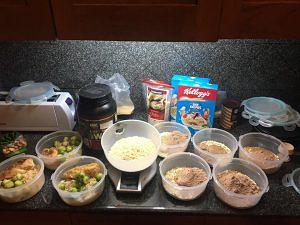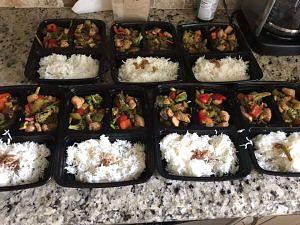Enter: Meal Prepping
Keep it ‘samey’

Meal Prep Example 1 – Sunday ‘Meal Prep’
Eggs:
- Batch cook an entire week of eggs (boiled, frittata, muffins, etc), and take what you need each morning.
- Cook it fresh every morning (this is the most common option). When you’re batch cooking every other meal, this can usually be made up in a minute or two in the morning fresh, and it tastes a lot better!
Liquid Meals:
- Weighed and portioned out at the start of the week and then eaten accordingly on the day.
- Prepped the night before or the morning of.

Main Meals:
- Pick your protein source, season accordingly, and then cook enough with your preferred method for the week.
- Let it cool to room temperature (this is key) before storing (see below on different methods).
- Bulk cook your choice of carbs. If potatoes, cut thinly to speed up cooking and roast them. If rice, you can simply boil a ton at once, and portion it out after.
- Roast your veggies so they hold texture. Tends to also work well in stir fry’s with the protein source. Another popular option is to use frozen veggie bags. Or in some cases, veggies are often chopped at the start of the week, and cooked on the day.
Storage:
- Once you’ve cooked it, so long as you bring it back to room temperature, it’ll be fine in the fridge for the week.
- You can either eat it cold, or warm it up in the microwave if you have one at work.
- You can also opt to keep only 3 to 4 days worth in the fridge, and put the rest in the freezer. Or even cook it all and freeze it at once. When it comes to eating the frozen, you can either microwave/heat straight from frozen, or let it defrost overnight and then heat it up. Make sure the food is piping hot when using this option.
Meal Prep Example 2 – The Biweekly Prep

Meal Prep Example 3 – The Daily Prep
- Cook extra at dinner. If you’re using the same protein source for your main meals, one option is to cook extra at dinner, and pack the rest up for the next day’s lunch. For your snacks and breakfast, they’re a lot simpler to prepare, so when you box your lunch up, you can get the other meals ready too (or cook breakfast fresh if time isn’t an issue)
- Cook everything each morning. This was something I did during my five years of commuting to the city, and it worked really well in that I didn’t actually create any dead time. Here’s how I did it, to the clock:
Meal Prep Example 4 – The Specific Food Prep
Should You Meal Prep Year Round?
- The condition you achieved during your fat loss phase starts slipping away quickly.
- You lose structure in your day, and you start to deviate from your meal plan.
- Too much scope for error. Laziness can creep in and you opt for easy options that make you satiated.
- You start eating out more than necessary, and begin to lose track of your calorie intake.
- You begin to make more bad choices, and find yourself caught ‘off guard’ more often. If you’ve got nothing prepared at work, and you’re hungry, it’s a lot easier to buy a chocolate bar than a protein packed meal!
- If you’re in a muscle building phase, you may struggle to reach all your calorie targets.


